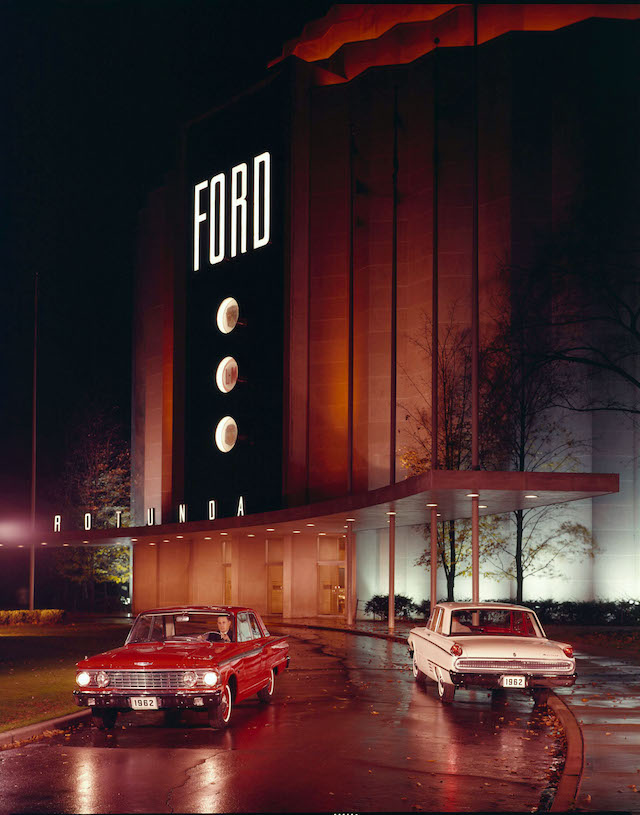Successful negotiation of everyday life would seem to require people to possess insight about deficiencies in their intellectual and social skills. However, people tend to be blissfully unaware of their incompetence. This lack of awareness arises because poor performers are doubly cursed: Their lack of skill deprives them not only of the ability to produce correct responses, but also of the expertise necessary to surmise that they are not producing them. People base their perceptions of performance, in part, on their preconceived notions about their skills. Because these notions often do not correlate with objective performance, they can lead people to make judgments about their performance that have little to do with actual accomplishment.
Ford Rotunda



The Ford Rotunda was a tourist attraction that was originally located on the South Side of Chicago, Illinois, and later was relocated to Dearborn, Michigan. At one point in the mid-20th century, it was the fifth most popular tourist destination in the United States. The Rotunda was built for the 1933 World’s Fair—”A Century of Progress International Exposition”—in Chicago. After the World’s Fair, the Rotunda was dismantled and rebuilt in Dearborn, serving as the visitor center for what was then the equivalent of Ford Motor Company’s world headquarters. The Rotunda was destroyed on Friday, November 9, 1962, by a fire.
“The kindest person in the room is often the smartest.”
J.B. Pritzker, speaking at Northwestern University’s 165th Commencement ceremony on June 12, 2023:
The best way to spot an idiot? Look for the person who is cruel. Let me explain.
When we see someone who doesn’t look like us, or sound like us, or act like us, or love like us, or live like us — the first thought that crosses almost everyone’s brain is rooted in either fear or judgment or both. That’s evolution. We survived as a species by being suspicious of things we aren’t familiar with. In order to be kind, we have to shut down that animal instinct and force our brain to travel a different pathway. Empathy and compassion are evolved states of being. They require the mental capacity to step past our most primal urges.
I’m here to tell you that when someone’s path through this world is marked with acts of cruelty, they have failed the first test of an advanced society. They never forced their animal brain to evolve past its first instinct. They never forged new mental pathways to overcome their own instinctual fears. And so, their thinking and problem-solving will lack the imagination and creativity that the kindest people have in spades.
Over my many years in politics and business, I have found one thing to be universally true: the kindest person in the room is often the smartest.
“It would be naïve to depend on the Supreme Court to defend the rights of poor people, women, people of color, dissenters of all kinds.”
Howard Zinn, writing in 2005:
It would be naïve to depend on the Supreme Court to defend the rights of poor people, women, people of color, dissenters of all kinds. Those rights only come alive when citizens organize, protest, demonstrate, strike, boycott, rebel, and violate the law in order to uphold justice.
The Constitution gave no rights to working people: no right to work less than 12 hours a day, no right to a living wage, no right to safe working conditions. Workers had to organize, go on strike, defy the law, the courts, the police, create a great movement which won the eight-hour day, and caused such commotion that Congress was forced to pass a minimum wage law, and Social Security, and unemployment insurance.
The right of a woman to an abortion did not depend on the Supreme Court decision in Roe v. Wade. It was won before that decision, all over the country, by grassroots agitation that forced states to recognize the right. If the American people, who by a great majority favor that right, insist on it, act on it, no Supreme Court decision can take it away.
The rights of working people, of women, of Black people have not depended on decisions of the courts. Like the other branches of the political system, the courts have recognized these rights only after citizens have engaged in direct action powerful enough to win these rights for themselves.
No Supreme Court, liberal or conservative, will stop the war in Iraq, or redistribute the wealth of this country, or establish free medical care for every human being. Such fundamental change will depend, the experience of the past suggests, on the actions of an aroused citizenry, demanding that the promise of the Declaration of Independence — an equal right to life, liberty, and the pursuit of happiness — be fulfilled.
Notes: The Little Book of Common Sense Investing
Notes from The Little Book of Common Sense Investing (2007) by John C. Bogle:
* Successful investing is about owning businesses and reaping the huge rewards provided by the dividends and earnings growth of our nation’s—and, for that matter, the world’s—corporations. The higher the level of their investment activity, the greater the cost of financial intermediation and taxes, the less the net return that shareholders—as a group, the owners of our businesses—receive. The lower the costs that investors as a group incur, the higher the rewards that they reap. So to enjoy the winning returns generated by businesses over the long term, the intelligent investor will reduce to the bare-bones minimum the costs of financial intermediation.
* Our system of financial intermediation has created enormous fortunes for those who manage other people’s money. Their self-interest will not soon change. But as an investor, you must look after your self-interest. Only by facing the obvious realities of investing can an intelligent investor succeed.
* In the investment field, time doesn’t heal all wounds. It makes them worse. Where returns are concerned, time is your friend. But where costs are concerned, time is your enemy.
* With each passing year, the reality is increasingly clear: relative returns of mutual funds are random. Yes, there are rare cases where skill seems to be involved, but it would require decades to determine how much of a fund’s success can be attributed to luck, and how much attributed to skill.
* While I can’t assure you that traditional index investing is the best strategy ever devised, I can assure you that the number of strategies that are worse is infinite.
* I urge you not to be tempted by the siren song of paradigms that promise the accumulation of wealth that are far beyond the rewards of the traditional index fund. Don’t forget the prophetic warning of Carl von Clausewitz, military theorist and Prussian general of the early nineteenth century: “The greatest enemy of a good plan is the dream of a perfect plan.”
* No matter what happens, stick to your program. Think long term. Patience and consistency are the most valuable assets for the intelligent investor.
* Whatever asset allocation strategy you decide is best for you, you absolutely must take into account the role of Social Security—a major source of income for most retirees—as you age. When determining their asset allocations, most investors need to take Social Security into consideration as a bond-like asset.
* The way to wealth, I repeat one final time, is not only to capitalize on the magic of long-term compounding of returns, but to avoid the tyranny of long-term compounding of costs. Avoid the high-cost, high-turnover, opportunistic marketing modalities that characterize today’s financial services system. While the interests of Wall Street’s businesses are well served by the aphorism “Don’t just stand there—do something!,” the interests of Main Street’s investors are well served by an approach that is its diametrical opposite: “Don’t do something—just stand there!”
“Confidence in a forecast rises with the amount of information that goes into it. But the accuracy of the forecast stays the same.”
Dean Williams:
One of the most consuming uses of our time, in fact, has been accumulating information to help us make forecasts of all those things we think we have to predict. Where’s the evidenced that it works? I’ve been looking for it. Really. Here are my conclusions: Confidence in a forecast rises with the amount of information that goes into it. But the accuracy of the forecast stays the same. And when it comes to forecasting—as opposed to doing something—a lot of expertise is no better than a little expertise. And may even be worse. The consolation prize is pretty consoling, actually. It’s that you can be a successful investor without being a perpetual forecaster.
We have security analysts. We get research reports from brokers. We get forecasts about the economy, interest rates, the stock market. We process that information and act on the basis of it. For all of that to make any sense, we all have to believe we can generate information which is unknown to the market as a whole.
There is an approach which is simpler and probably stands a better chance of working. Spend your time measuring value instead of generating information. Don’t forecast. Buy what is cheap today. Let other people deal with the odds against predicting the future.
“Trying Too Hard”, Financial Analysts Federation Seminar 1981 [PDF]
“Time is the friend of someone properly positioned and the enemy of someone poorly positioned.”
You don’t need to be smarter than others to outperform them if you can out-position them.
Anyone looks like a genius when they’re in a good position, and even the smartest person looks like an idiot when they’re in a bad one. When circumstances change, the person with low leverage and cash in the bank has many ways to play their hand and come out on top. On the other hand, the person with high leverage and no cash buffer has few.
Time is the friend of someone properly positioned and the enemy of someone poorly positioned.
“Nothing has served me better in my long life than continuous learning.”
Charlie Munger, speaking at USC Law School Commencement in 2007:
Wisdom acquisition is a moral duty. It’s not something you do just to advance in life. As a corollary to that proposition which is very important, it means that you are hooked for lifetime learning. And without lifetime learning, you people are not going to do very well. You are not going to get very far in life based on what you already know. You’re going to advance in life by what you learn after you leave here.
I constantly see people rise in life who are not the smartest, sometimes not even the most diligent, but they are learning machines. They go to bed every night a little wiser than they were when they got up and boy does that help, particularly when you have a long run ahead of you.
Nothing has served me better in my long life than continuous learning.
Notes: How the World Really Works: The Science Behind How We Got Here and Where We’re Going
Notes from How the World Really Works: The Science Behind How We Got Here and Where We’re Going (2022) by Vaclav Smil:
* Since the year 2007, more than half of humanity has lived in cities (more than 80 percent in all affluent countries), and unlike in the industrializing cities of the 19th and early 20th centuries, jobs in modern urban areas are largely in services. Most modern urbanites are thus disconnected not only from the ways we produce our food but also from the ways we build our machines and devices, and the growing mechanization of all productive activity means that only a very small share of the global population now engages in delivering civilization’s energy and the materials that comprise our modern world.
* The proverbial best minds do not go into soil science and do not try their hand at making better cement; instead they are attracted to dealing with disembodied information, now just streams of electrons in myriads of microdevices. From lawyers and economists to code writers and money managers, their disproportionately high rewards are for work completely removed from the material realities of life on earth.
* The real wrench in the works: we are a fossil-fueled civilization whose technical and scientific advances, quality of life, and prosperity rest on the combustion of huge quantities of fossil carbon, and we cannot simply walk away from this critical determinant of our fortunes in a few decades, never mind years. Complete decarbonization of the global economy by 2050 is now conceivable only at the cost of unthinkable global economic retreat, or as a result of extraordinarily rapid transformations relying on near-miraculous technical advances.
* Most recently, a poor understanding of energy has the proponents of a new green world naively calling for a near-instant shift from abominable, polluting, and finite fossil fuels to superior, green and ever-renewable solar electricity.
* Even in this era of high-tech electronic miracles, it is still impossible to store electricity affordably in quantities sufficient to meet the demand of a medium-sized city (500,000 people) for only a week or two, or to supply a megacity (more than 10 million people) for just half a day.
* If the COVID-19 pandemic brought disruption, anguish, and unavoidable deaths, those effects would be minor compared to having just a few days of a severely reduced electricity supply in any densely populated region, and if prolonged for weeks nationwide it would be a catastrophic event with unprecedented consequences.
* The fundamental energy conversion producing our food has not changed: as always, we are eating, whether directly as plant foods or indirectly as animal foodstuffs, products of photosynthesis—the biosphere’s most important energy conversion, powered by solar radiation. What has changed is the intensity of our crop, and animal, production: we could not harvest such abundance, and in such a highly predictable manner, without the still-rising inputs of fossil fuels and electricity.
* Many people nowadays admiringly quote the performance gains of modern computing (“so much data”) or telecommunication (“so much cheaper”)—but what about harvests? In two centuries, the human labor to produce a kilogram of American wheat was reduced from 10 minutes to less than two seconds.
* The quest for mass-scale veganism is doomed to fail. Eating meat has been as significant a component of our evolutionary heritage as our large brains (which evolved partly because of meat eating), bipedalism, and symbolic language. All our hominin ancestors were omnivorous, as are both species of chimpanzees (Pan troglodytes and Pan paniscus), the hominins closest to us in their genetic makeup; they supplement their plant diet by hunting (and sharing) small monkeys, wild pigs, and tortoises. Full expression of human growth potential on a population basis can take place only when diets in childhood and adolescence contain sufficient quantities of animal protein, first in milk and later in other dairy products, eggs, and meat: rising post-1950 body heights in Japan, South Korea, and China, as a result of increased intake of animal products, are unmistakable testimonies to this reality.
“Inherited wealth is a real handicap to happiness.”
William K. Vanderbilt, quoted in Fortune’s Children: The Fall of the House of Vanderbilt:
My life was never destined to be quite happy. It was laid out along lines which I could not foresee, almost from earliest childhood. It has left me with nothing to hope for, with nothing definite to seek or strive for. Inherited wealth is a real handicap to happiness. It is as certain death to ambition as cocaine is to morality.
If a man makes money, no matter how much, he finds a certain happiness in its possession, for in the desire to increase his business, he has a constant use for it. But the man who inherits it has none of this. The first satisfaction, and the greatest, that of building the foundation of a fortune, is denied him. He must labor, if he does labor, simply to add to an oversufficiency.